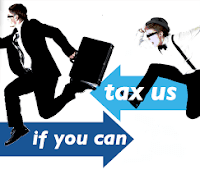According to accountingTODAY, private wealth clients, hedge fund managers and cryptocurrency traders fleeing to Puerto Rico for its huge tax breaks and to escape President Joe Biden’s proposed capital gains tax increases are now the focus of a sweeping Internal Revenue Service review.
The country’s tax collector quietly launched a coordinated campaign in late January to examine individuals who took advantage, starting in 2012, of tax incentives designed to lure high net-worth individuals and corporations to Puerto Rico. More than 4,000 mainland U.S. residents and firms have moved to the territory between 2012 and 2019, revealing potentially hundreds of millions of dollars in lost tax revenue to the U.S. government, according to an IRS report delivered to Congress.
Individuals Have Already Started Receiving Requests For Information, According To Tax Attorneys That Advise Clients On Federal Income Tax Issues Under PR Tax Incentive Laws.
That The U.S. Tax Filing Deadline Has Passed.
At issue are taxpayers who may have excluded income subject to U.S. tax, or failed to file and report income altogether when they moved to Puerto Rico, according to the IRS notice. The agency is also targeting those who claim to be bona fide residents of Puerto Rico but may be “erroneously reporting” U.S. income to evade taxes.
It also comes amid a wider crackdown by the Treasury Department, which recently released
estimates showing wealthy taxpayers as a group are hiding billions of dollars in income. Treasury Secretary Janet Yellen has previously warned that if left unaddressed the tax gap could grow to $7 trillion over the next decade. Campaigns by the IRS often take years to organize, as agents begin to detect factual patterns that indicate a significant loss of revenue due to noncompliance.
In The Case of Puerto Rico, Much of The Focus Will Be on Establishing Whether Individuals Are Truly Island Residents
and Whether They Properly Sourced Income to Puerto Rico.
The IRS’ report to Congress calculated that more than 1,924 applicants, corporations, LLCs, partnerships and other types, had been granted tax benefits under the Exports Services Act (formerly known as Act 20) as of March 2020 based on partial information provided by Puerto Rico. Act 20 offers entities a 4% corporate rate on business income and 100% tax exemption on dividends. That provision along with the Individual Investors Act have now been consolidated into a new incentive law to attract individuals and investments to the island.
More than 2,300 individuals were also granted tax exemptions on passive income, such as dividends and capital gains, under the Individual Investors Act (formerly known as Act 22) between 2012 and 2019, according to the IRS report. Of those individuals, the IRS could identify only 25% or 647 individuals who had previously resided in California, Florida, New Jersey, New York and Texas. They paid nearly $558 million in combined federal income taxes in the five years prior to their relocation to Puerto Rico, representing a fraction of potential loss revenue to the U.S. Treasury’s coffers.
The Trend to Leave the US For Puerto Rico
Has Continued Since the Start of the Pandemic.
Witth the number of Manhattan residents relocating to Puerto Rico growing by at least fourfold compared to the previous year, according to change of address data from the United States Postal Service.
Between March 2020 and February 2021, at least 82 requests were filed for permanent moves to Puerto Rico by New York City residents compared with only 22 the previous year. Additionally, at least another 11 Manhattan addresses temporarily forwarded their mail during the pandemic to the island. None had done so the year prior.
Many are day traders without traditional jobs that spend their wealth making trades on stocks, securities, commodities and cryptocurrencies, earning capital gains that are 100% tax-exempt. Others include investment bankers and hedge fund managers, who either manage funds or provide financial advice to clients, allowing them to earn tax-exempt carried interest.
Individuals Identified by the IRS Will Have to Prove
Their Puerto Rican Residency,
a Key Factor in Claiming the Tax Benefits.
Taxpayers Must Live on The Island For A Minimum of 183 Days Annually Every Year to Be Considered A Bona Fide Resident.
Maintaining a residency goes beyond simply leasing an apartment in popular Dorado Beach. It includes bringing your main possessions, joining local clubs, updating your voter registration status, moving with your spouse, and enrolling your children in the island’s schools.
“You should also try to minimize contact with mainland U.S.,” said Carballo-Irigoyen. “If the IRS were to audit and they look at your life, they have to be convinced this is where you live.”
Moving, even if someone has qualified for tax incentives from Puerto Rico, doesn’t necessarily make someone exempt from filing a U.S. tax return, Leeds said. Also, “it’s only Puerto Rico source income that is eligible for exemption. It’s not foreign source. It’s not U.S. source. Only Puerto Rico source.”
Want to Become a PR Resident
and Reduce Your Taxes?
Contact the Tax Lawyers at
Marini & Associates, P.A.
Read more at: Tax Times blog







